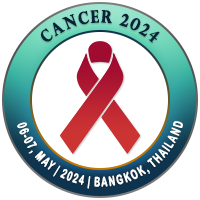
Chiu Ling-jung
Chang Gung Memorial Hospital, TaiwanTitle: Real-world evidence of daratumumab-lenalidomide-dexamethasone in relapsed/refractory multiple myeloma patients: A single centre experience in Taiwan focusing on efficacy
Abstract
Background: Daratumumab (DARA) introduced in the multiple myeloma (MM) treatment strategy, producing a direct anti-tumor activity and immunomodulatory effects in phase I-II trial GEN501. In the POLLUX trial, the combination of daratumumab with lenalidomide and dexamethasone (DRd) reported impressive response rates. In Taiwan, Dara-based regimen was supported by National Health Insurance recently, but there were no real-world data in Taiwan.
Materials and methods: We described a heavily pretreated group of 31 patients with MM who had received one or more lines of therapy to receive DRd therapy after Taiwan Food and Drug Administration approval. The primary end point was progression-free survival (PFS).
Results: After a median follow-up of 22.87(95% CI 16-29.73) months, median time to first response was 59 days (95% CI 24.8-81.6). Median PFS was 24.082 months (95% CI 14 - 33) in patients received DRd therapy. Twelve-months PFS showed 80.7% in DRd group. Patients who achieved at least VGPR had longer median PFS (39.8 months) than those who achieved partial response (7.35 months). The complete response rate and VGPR were 35.5% and 29%, respectively. 22.6% patient had partial response. The average treatment duration was 11.48±±7 months. Patient experienced biological relapsed at 5.88 months after discontinuing DRd treatment. Conclusion: After DRd treatment for 11.48 months, most of the patient showed biological relapsed at 5.88 month suggesting the good efficacy, however, the need of longer maintenance treatment of daratumumab. The median PFS in real-world setting was consistent with the POLLUX trial regardless of more patients with high cytogenetic risks. Patient who could achieve deep response above VGPR had better PFS than who did not.
Biography
To be updated soon.

